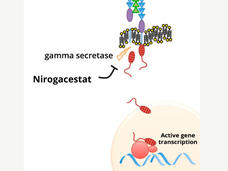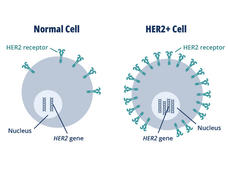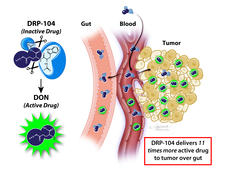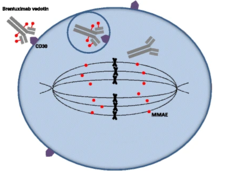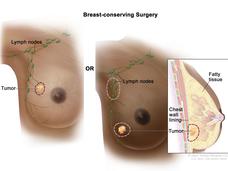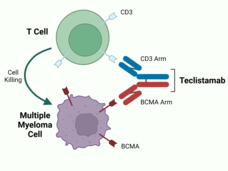Treatment - Cancer Currents Blog
Cancer treatment related news, with context from leading experts. Includes articles on new therapies, treatment side effects, and important trends in treatment-related research.
-
Rare Melanoma Very Likely to Respond to Treatment with Pembrolizumab
People with desmoplastic melanoma, a rare form of skin cancer, are likely to benefit from treatment with a single immunotherapy drug, pembrolizumab (Keytruda), according to new results from a small clinical trial.
-
Nirogacestat May Offer Hope to People with Desmoid Tumors
In a clinical trial, the drug nirogacestat shrank tumors in 40% of people with desmoid tumors. Treatment with nirogacestat also substantially improved progression-free survival, pain, and physical functioning, compared with patients treated with a placebo.
-
Revumenib Shows Promise in Treating Advanced Acute Myeloid Leukemia
Treatment with revumenib caused complete remission in about one-third of participants in an early-phase clinical trial involving patients who’d had many prior treatments. Revumenib is part of a new class of targeted drugs known as menin inhibitors.
-
Immunotherapy’s Role in Treating Endometrial Cancer Expected to Grow
In two clinical trials, combining immune checkpoint inhibitors with standard chemotherapy substantially increased how long people with advanced endometrial cancer lived without their cancer worsening, particularly those with dMMR or MSI-high tumors.
-
Cancer and Climate Change: The Health Threats of Unnatural Disasters
The consequences of climate change have already affected cancer care in the United States, particularly in areas hit by hurricanes and wildfires. Researchers are studying how to mitigate that impact and better understand the effect of climate change on the risk of developing cancer.
-
Immunotherapy after Surgery Shows Long-Term Benefits for High-Risk Bladder Cancer
Updated results from a large clinical trial confirm that, for some people with bladder cancer, receiving immunotherapy after surgery is an effective treatment. In 2021, initial results from the same trial led to FDA approval of nivolumab (Opdivo) for this use.
-
Dexrazoxane Protects the Heart Long Term for Kids Being Treated for Cancer
Doxorubicin is used to treat many types of childhood cancer, but it can damage the heart. Giving dexrazoxane (Zinecard) before each dose substantially decreases a child’s risk of treatment-related heart problems in adulthood, new study results show.
-
Lung-Sparing Surgery Is Effective for Some with Early-Stage Lung Cancer
For certain people with early-stage non-small cell lung cancer, sublobar surgery to remove only a piece of the affected lung lobe is as effective as surgery to remove the whole lobe, new research shows.
-
Tucatinib and Trastuzumab Combination Approved for Advanced Colorectal Cancer
FDA approved tucatinib (Tukysa) with trastuzumab (Herceptin) to treat HER2-positive advanced colorectal cancer. The approval was based on the MOUNTAINEER trial, in which nearly 40% of participants’ tumors shrank after receiving the drug combination.
-
Help Desk for Oncologists Treating People with a Rare Leukemia Pays Big Dividends
An NCI-funded clinical trial has shown that treatment-related early deaths in people with a rare leukemia can be dramatically reduced. How did they do it? In part, by establishing a help desk staffed by experts in treating APL.
-
Trial Suggests Expanded Role for Blinatumomab in Treating ALL
The immunotherapy drug blinatumomab (Blincyto) extends life for people with acute lymphoblastic leukemia who are in remission, even those with no signs of disease after initial treatment, a trial has found.
-
Pausing Long-Term Breast Cancer Therapy to Become Pregnant Appears to Be Safe
Many young women who are diagnosed with early-stage breast cancer want to become pregnant in the future. New research suggests that these women may be able to pause their hormone therapy for up to 2 years as they try to get pregnant without raising the risk of a recurrence in the short term.
-
A Safer, Better Treatment Option for Some Younger Women with Breast Cancer
For younger women with advanced breast cancer, the combination of ribociclib (Kisqali) and hormone therapy was much better at shrinking metastatic tumors than standard chemotherapy treatments, results from an NCI-funded clinical trial show.
-
Can Chemotherapy Drugs Be Designed to Avoid Side Effects?
Researchers have modified a chemo drug, once abandoned because it caused serious gut side effects, so that it is only triggered in tumors but not normal tissues. After promising results in mice, the drug, DRP-104, is now being tested in a clinical trial.
-
Brentuximab Approved for High-Risk Hodgkin Lymphoma in Children and Adolescents
Based on an NCI-sponsored clinical trial conducted by the Children’s Oncology Group, FDA has approved the drug brentuximab vedotin (Adcetris) in combination with chemotherapy for some children and adolescents with Hodgkin lymphoma.
-
Shorter Course of Radiation Is Effective, Safe for Some with Early-Stage Breast Cancer
In a large clinical trial, a condensed course of radiation therapy was as effective and safe as a longer standard course for those with higher-risk early-stage breast cancer who had a lumpectomy. This shorter radiation course makes treatment less of a burden for patients.
-
Immunotherapy before Surgery Appears Effective for Some with Melanoma
For melanoma that can be treated with surgery, a few doses of pembrolizumab (Keytruda) beforehand looks to be a good choice. In a clinical trial, people who got the presurgical immunotherapy were much less likely to have their cancer come back than those who only received it after surgery.
-
Teclistamab Shows Promise for People with Heavily Pretreated Multiple Myeloma
In a small clinical trial, nearly 40% of people with multiple myeloma who were treated with the immunotherapy drug teclistamab (Tecvayli) had all signs of their cancer disappear. The trial participants had myeloma that did not respond to or came back after three or more prior treatments.
-
Enhertu Marks First Targeted Therapy for HER2-Mutant Lung Cancer
On August 11, the Food and Drug Administration (FDA) gave accelerated approval to trastuzumab deruxtecan (Enhertu) for adults with non-small cell lung cancer (NSCLC) that has a specific mutation in the HER2 gene. Around 3% of people with NSCLC have this kind of HER2 mutation.
-
Study Confirms Dinutuximab Extends Life for Children with High-Risk Neuroblastoma
Researchers have confirmed that the immunotherapy drug dinutuximab (Unituxin) can help children with high-risk neuroblastoma live longer. The finding is based on a trial of nearly 1,200 children with the disease.

